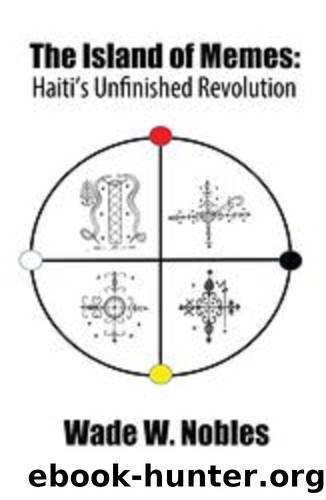Island of Memes: Haiti's Unfinished Revolution by Nobles Wade

Author:Nobles, Wade [Nobles, Wade]
Language: eng
Format: epub
Publisher: Black Classic Press/Inprint Editions
Published: 2016-04-08T16:00:00+00:00
Chapter Six
Tornadoes of the Mind: Revisiting the Unfinished Revolution
“And you know, Kristi, something happened a long time ago in Haiti, and people might not want to talk about it. They were under the heel of the French, you know, Napoleon the Third and whatever, and they got together and swore a pact to the devil. They said, ‘We will serve you if you’ll get us free from the French.’ True story. And so the devil said, ‘O.K., it’s a deal.”’
This final chapter begins with a quote from the “memetically infected” televangelist Pat Robertson. 1 His thoughts typify the hidden underbelly of most people’s perception of the core African spiritual system found throughout the African world, especially in Haiti. The question of Haiti’s restoration is, for Robertson and others, inextricably connected to the need to de-Africanize and demonize Haiti’s retention of its African spiritual system (i.e., Vodou). What has come to be known as Voodoo in Haiti, and the ongoing need to eliminate Haiti’s retention of it, has served as the hidden litmus test, ergo, the rejection or denial of Haiti’s acceptance into the “modern” world of free and independent nations.
In effect, the lingering psychological effect of the Trans-Atlantic Slave Trade in Africans has been the continuous and constant assault and redefining of the African sense of being human and African. The result of this situation is defined as the shattering of consciousness and fracturing of identity. Shattered consciousness and fractured identity have resulted in a state of “spirit damage,” which limits, curtails, and contains the African’s capacity to be a full knowing and knowable unfolding spirit capable of achieving a never-ending totality of possibilities emerging from the African diaspora’s ever-expanding perceivable and unperceivable multiverse. Restoration of shattered consciousness and shattered identity must be the central impetus in Haiti’s recovery.
When one’s consciousness is shattered, identity fractured, and self (person) alienated, distorted, or violated, the result causes a disability or malfunctioning that extends into and affects (however, subtly) each and every other self (person) in the community. What is even more profound is that the “sickness” (weakness) or “health” (strength) of past generations also extends into and affects those who are alive today. The trauma of past enslavement extends into each of their descendants.
The retention of European (French) memetic ideations found in Haitian consciousness was ideas and beliefs supportive of aristocracy and class privilege. It also included inherited role status (hierarchies), elitism, subjugation, life-long slavery, racial/genetic inferiority, hierarchies, apostolic authority, exaltation of Christ and Christianity, and “whiteness,” particularly Frenchness (viewed as sacred, superior, and powerful). To be civilized was, in deed and image, equaled to White (French), denigration of Africa, class privilege, patriarchal domination, caste (permanent attribution and place), and individualism. The Haitian was “civilized” to respect only European ownership of land and people; sanctioned acclimation to enslavement, acceptance of capricious evil acts as normal punishment (from rape to family separation to killings), personal inferiority, and the perpetuation of social distinctions.
The memetic ideation of the Code Noir essentially codified and in some
Download
This site does not store any files on its server. We only index and link to content provided by other sites. Please contact the content providers to delete copyright contents if any and email us, we'll remove relevant links or contents immediately.
| African-American Studies | Asian American Studies |
| Disabled | Ethnic Studies |
| Hispanic American Studies | LGBT |
| Minority Studies | Native American Studies |
Cecilia; Or, Memoirs of an Heiress — Volume 1 by Fanny Burney(32558)
The Great Music City by Andrea Baker(32019)
Cecilia; Or, Memoirs of an Heiress — Volume 2 by Fanny Burney(31956)
Cecilia; Or, Memoirs of an Heiress — Volume 3 by Fanny Burney(31942)
We're Going to Need More Wine by Gabrielle Union(19046)
All the Missing Girls by Megan Miranda(16028)
Pimp by Iceberg Slim(14507)
For the Love of Europe by Rick Steves(14121)
Bombshells: Glamour Girls of a Lifetime by Sullivan Steve(14075)
Talking to Strangers by Malcolm Gladwell(13370)
Norse Mythology by Gaiman Neil(13365)
Fifty Shades Freed by E L James(13241)
Mindhunter: Inside the FBI's Elite Serial Crime Unit by John E. Douglas & Mark Olshaker(9343)
Crazy Rich Asians by Kevin Kwan(9292)
The Lost Art of Listening by Michael P. Nichols(7506)
Enlightenment Now: The Case for Reason, Science, Humanism, and Progress by Steven Pinker(7313)
The Four Agreements by Don Miguel Ruiz(6765)
Bad Blood by John Carreyrou(6621)
Weapons of Math Destruction by Cathy O'Neil(6280)
